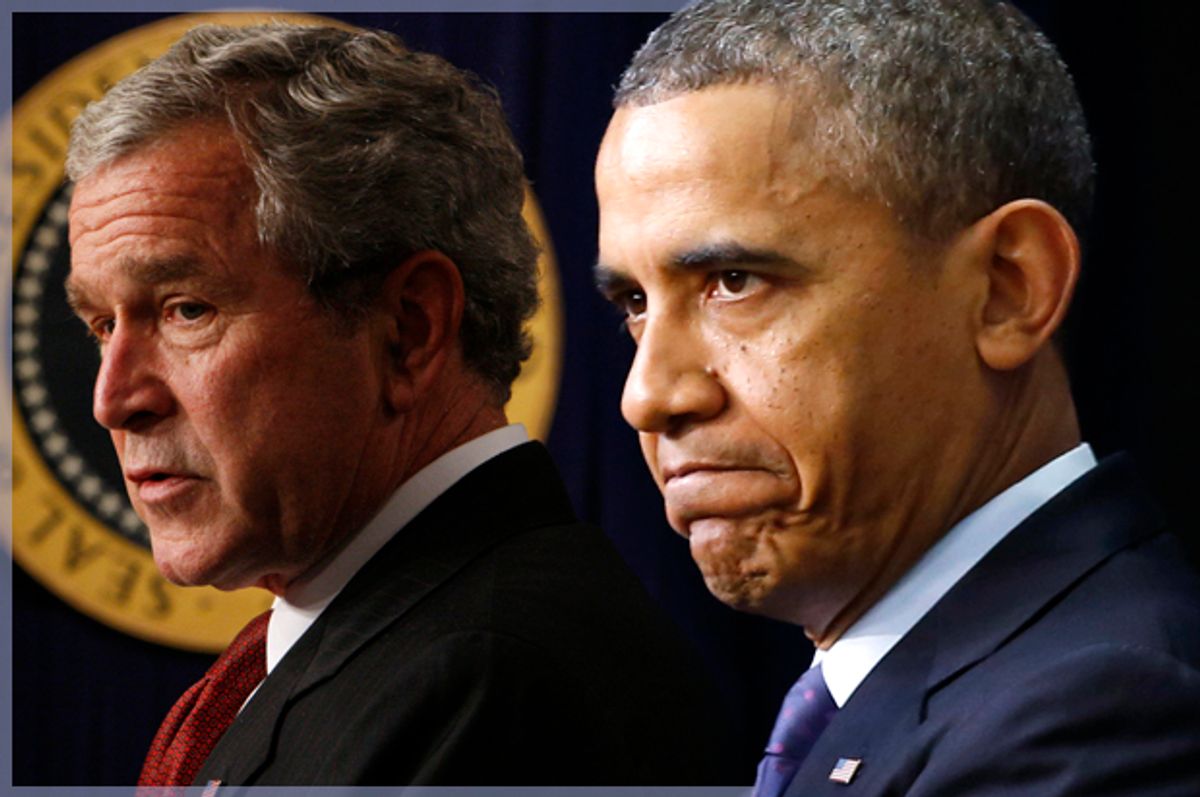President Obama declared in his speech Wednesday night that "I have the authority to address the threat from ISIL," while adding, halfheartedly, that "I welcome congressional support for this effort in order to show the world that Americans are united in confronting this danger." He has outlined a specific role for Congress to play in an attempt to secure some sort of "buy-in" -- passing funding to arm and train whatever few nice people exist in Syria -- but he says he won't need any new, formal authorization. Congress could pass one on its own volition, but there's an election coming up and members of Congress are pathetic moral cowards.
So on what "authority" is the president basing his open-ended long war to "destroy" a cross-border army in two failed Middle Eastern nations modest terrorist-zapping operation? The Authorization for Use of Military Force (AUMF) passed shortly after Sept. 11, 2001. It granted the president authority to wield military force against "those nations, organizations, or persons he determines planned, authorized, committed, or aided the terrorist attacks that occurred on September 11, 2001, or harbored such organizations or persons."
Hmm.
One of the first things that everyone in the media likes to say about ISIS is that they were "kicked out" or denounced by al-Qaida for being too extreme. (That's sort of the cartoonish explanation. There was a power struggle, etc.) That means they are no longer a part of al-Qaida, and al-Qaida was the "organization" that carried out the "terrorist attacks that occurred on September 11, 2001." So there's the clean break, if you will, that seems to show pretty clearly that a military plan against ISIS is not covered under the AUMF. One could also argue more broadly, as many members of the national security have been for years, that the AUMF, considered the basis of the "global war on terror," is such a dated document that its drafters never intended for it to be used in the manner it's being used today. President Obama himself last year called for repeal of the AUMF, saying that it "promotes perpetual war and grants presidents too much power," as the Huffington Post reported.
An administration official explained to the Guardian's Spencer Ackerman, however, that the administration considers ISIS' well-publicized split with al-Qaida "legally immaterial."
Based on ISIL’s longstanding relationship with al-Qa’ida (AQ) and Usama bin Laden; its long history of conducting, and continued desire to conduct, attacks against U.S. persons and interests, the extensive history of U.S. combat operations against Isil dating back to the time the group first affiliated with AQ in 2004; and Isil’s position - supported by some individual members and factions of AQ-aligned groups - that it is the true inheritor of Usama bin Laden’s legacy, the President may rely on the 2001 AUMF as statutory authority for the use of force against Isil, notwithstanding the recent public split between AQ’s senior leadership and Isil.
You can take the man out of al-Qaida, but you can't take the al-Qaida out of a man. They all graduated from the same Terrorist High School. Choose whatever lame metaphor you like.
This is what's confusing a lot of people: Why not get a new authorization for this anyway, just to have the legal basis on firmer footing? Public opinion polls and politicians' insane rhetoric suggest that, even though Congress members would prefer never to vote on anything, a new AUMF wouldn't be all that arduous a measure to pass. The decision not to insist on clear authorization leaves Obama vulnerable not just to criticism for every bad thing that happens in both Iraq and Syria for the next couple of years, but also to criticism about how it was an illegal war all along.
The most flattering explanation for the White House's decision to discard authorization is that it's worried about Congress giving the presidency too much power. What if he handed the ball to Congress, and the authorization they returned to his desk was one like that introduced by Rep. Frank Wolf? That's the "super-AUMF" that would essentially codify the president's powers to wage war against anyone, anywhere, forever. Obama may think that an AUMF like that wouldn't be the best thing to leave for his successors in perpetuity. Indeed, this is a flattering explanation, which is why it doesn't hold up. He could always lay out the contours for a narrowly tailored AUMF he wants from Congress and pledge to veto anything else. And what sort of logic is it to say that you're worried about giving the executive branch too much power, so instead you're going to aggressively push the envelope on existing war powers?
The truth is Obama's doing this because it's easier, he doesn't want to deal with an election-minded Congress' bullshit, and he knows that no one's going to stop him. Sadly that's why, as fascinating as we find this legal debate, we feel almost tedious writing about it. What's the point in even discussing the "legality of war"? We now have two (three? four? 43?) presidents in a row who've taken the "well, we see them more as guidelines" approach to the field. And they've been enabled by Congresses that don't want to come within 100 miles of anything representing a difficult decision.



Shares